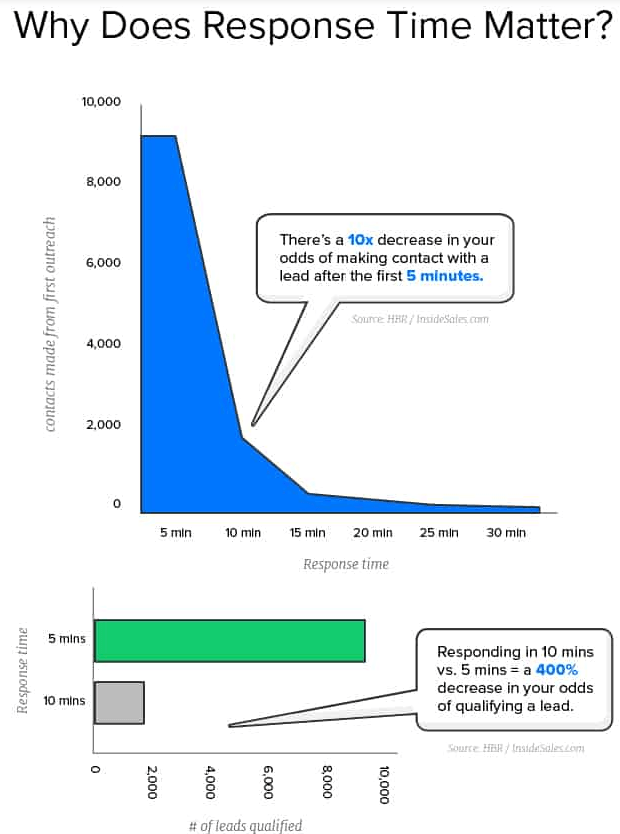As we mentioned in our last post about the quote enquiry, the most important factor about making your sales call is how soon you do it. The quicker you are to respond to the customer the more likely you’ll win the sale. 78% of customers buy from the first responder (Lead Connect). In the Lead Response Management Study companies who contacted leads within an hour were seven times more likely to qualify the lead, than the companies who decided to contact customers just an hour later and sixty times more likely than the companies who waited 24 hours or longer.
Why does time matter?
- The moment the customer enquiries they are in a buying mindset. They are looking to get questions answered. Wait too long and they will be dealing with other things and not in such an immediate buying mood.
- Let’s assume the enquiry came out of office hours. The longer you wait the next day, the more likely it is that the lead has already spoken with 1, 2 maybe 3 other surveyors. The first surveyor has the opportunity to offer as much new information about surveys as they want. The second surveyor will be mainly repeating what has already been said – the value they can add is lower. By the time your third on the list you’re going to have to work much harder to impress the client. Not only that they probably don’t want to hear more sales pitches now!


Going back to the sales funnel mentioned in our first post, this is a key stage where leads can leak from the funnel. A slow response ultimately provides a poor customer experience versus those that are responsive. It also sends a signal – if you are slow now when it comes to winning business, how slow will you be when you’ve already got the cash. Of course you are a professional, but these are the considerations that balance in a customer’s mind following bad experiences in other industries.
To provide a good experience and to keep the sales funnel as full as possible this call needs to be as soon as possible. Maybe not in the first few seconds so you don’t come across too aggressive but certainly within the hour, if within office hours.
Options to become more responsive:
- Respond regardless of where you are. Clearly this isn’t practical or you’d be doing that already. Responding like this will be distracting during an inspection (or driving) and looks unprofessional if there are people in the property. It can also affect your productivity – jumping from one task to another will slow you down.
- Hire someone who can deal with leads. This could be a permanent role if you have a large number of enquiries and are growing your business or someone who is paid on a success basis. You pay them a commission or fixed fee for every lead they covert.
- Form a collective – are there other local businesses you can work with to pool resources? If there is another surveying firm offering other survey types that work well with your service, a mortgage broking firm or conveyancers that like to refer to offer a better service, are there resources you can share that overall means you boost business for each other?
- Form a group with surveyors from other local areas and have someone that can support the sales process for all your enquiries that come in. You can split the cost of someone to deal with these leads between you whilst getting the benefit of having someone who can respond more quickly and allow you to get on with surveys.
- Create automated questionnaires – are most of your enquiries around which survey is right for the customer? You can provide an automated questionnaire that guides a customer to the right survey for their property and needs. See this example.
The importance of a quote form
Providing a quote online does not mean losing out on opportunities to speak to the customer. In fact, if set up correctly it can mean quite the opposite… A customer fills in your quote form and gets a quote. You now have their details to be able to contact them and answer any questions they may have about your service. These are the details of a customer who otherwise may not have bothered to make an enquiry.
To get as much as possible from your leads you can also set up automated email flows to provide further information about your service to your customers with no additional effort.
Customers are savvy though. A contact form disguised as a quote form will have low conversion rates. It is very clear to a customer that a contact form labelled ‘Get a Quote’ is not going to offer them instant gratification. In today’s society of a 2 hour turnaround on online deliveries with Prime Now a contact form for quotes doesn’t cut it. If a customer fills in a form expecting to get a quote and all that happens is it says ‘Thanks for submitting your details’ the customer feels frustrated. That is the opposite of what you want to achieve.

This makes what could have been a positive touch point a negative one. Make sure your quote form actually offers a quote. Customers are realistic – they know that you can’t always provide an immediate quote. There may be variables that need consideration first but it should be setup to provide them one wherever you can. Where you can’t offer a quote now, customers will see from the setup you’ve made a genuine effort to provide one and not just attempt to get their details.
The Actual Call
You’ve been responsive and you’re on the phone to the customer. Before you start the sales pitch. STOP. The sales call isn’t about you. It is about the customer. To sell effectively (and make your job of doing that much easier) you need to understand the customer. Why do they even want a survey? The obvious answer is they want to know the condition of the property. That’s fine assuming their initial search intent… are they already sold on why they are getting a survey or has someone told them it’s something they should do…? We’ll come onto the difference.

Questions to ask
What stage are they in the home buying process?
They may be ready to go or early in the process. If they are early in the process how can you offer advice about things to look out for on viewings? Simple advice can leave the customer feeling in a stronger position as they view properties and keen to speak to you again later following a lasting good feeling.
How soon do they need a survey?
Are they ready to go ahead but their survey isn’t urgent? Or do they need it tomorrow because they’ve left things too late? If you can’t meet a short deadline then there is no need to keep speaking.
Why do they want a survey?
The customer may be clued up and know the benefits of getting a survey. Equally they may have just heard from a friend or family member that it’s a good idea to get one. In the latter case you don’t just need to explain what makes your service better than Joe Bloggs down the road but the whole value in even getting a survey. They first need convincing of the value of spending money on a survey before they need convincing of the value of spending a bit more on your service than someone else’s.
What do they want to find out from the report?
Have they seen something that concerns them or do they have plans for the future they want advice on? They might just want guidance on what maintenance is needed now and in the next 5 years so they can make a plan.
Who else have they spoken to?
Chances are you aren’t the only person they have contacted or will contacted. It is useful to know who they have spoken with before so you can angle your pitch to explain what else you will do that they maybe do not. Do not speak badly of any competitors – this will put any customer off. You can advise where you can offer more value on their specific needs or maybe even where another surveyor is better suited. On top of this, it helps you to see who else is on your customers radar. Has a new company popped up that you should be aware of? The more information you can find out at the start of this call, the better you can advise on the right type of survey (you knew that) and the better you can gauge their intent of going ahead. You’ll also be in a stronger position to provide a great report when they do go ahead because you can provide a tailored response and not a generic report.
Of course, you do need to mention why you and not another local surveyor. Remember, others will say:
- They are a member of RICS
- They are local
- They have X years experience
- That they can send you a video telling them about different survey types
- That the Homebuyer Report will offer them traffic light ratings
None of that says why you. You need to know what your proposition is. What makes you and your service different. If you can’t explain what you do differently for the customer, they won’t understand either. If you write down your proposition now in 7 words, what is it? Can you even think of what it is?
Here are some questions to think about….
- How do you offer value?
- Why are you quicker or longer to submit a report? (There are benefits to both)
- What do you include in your report that others don’t?
- What information are you able to gather on site that others cannot and what does that mean for the customers peace of mind?
How to you help your customer make their next decision of their property purchase with ease? What do you do that gives them confidence and stops them staying awake at night?

Take aways:
There are a whole list of factors to consider. Responsiveness is a huge factor in removing leaks in your sales funnel and pushing as many leads into sales.
Understanding each customers specific needs and why they’ve even made an enquiry will allow you to ensure you spend time on telling them the points that matter to them. Throw in all the information you can (including the kitchen sink) and the customer will have to work harder to learn why they should go ahead.
Know your proposition. If you can’t write down in a few words what value you offer to clients, they won’t receive that message when you’re speaking to them. Don’t worry if you can’t answer the question straight away. It takes time to understand what value you want to convey and how to put that succinctly into words. But once you invest the time to get that right, conveying your message gets easier.
Take a look at some of these value propositions and get inspired to write yours.
